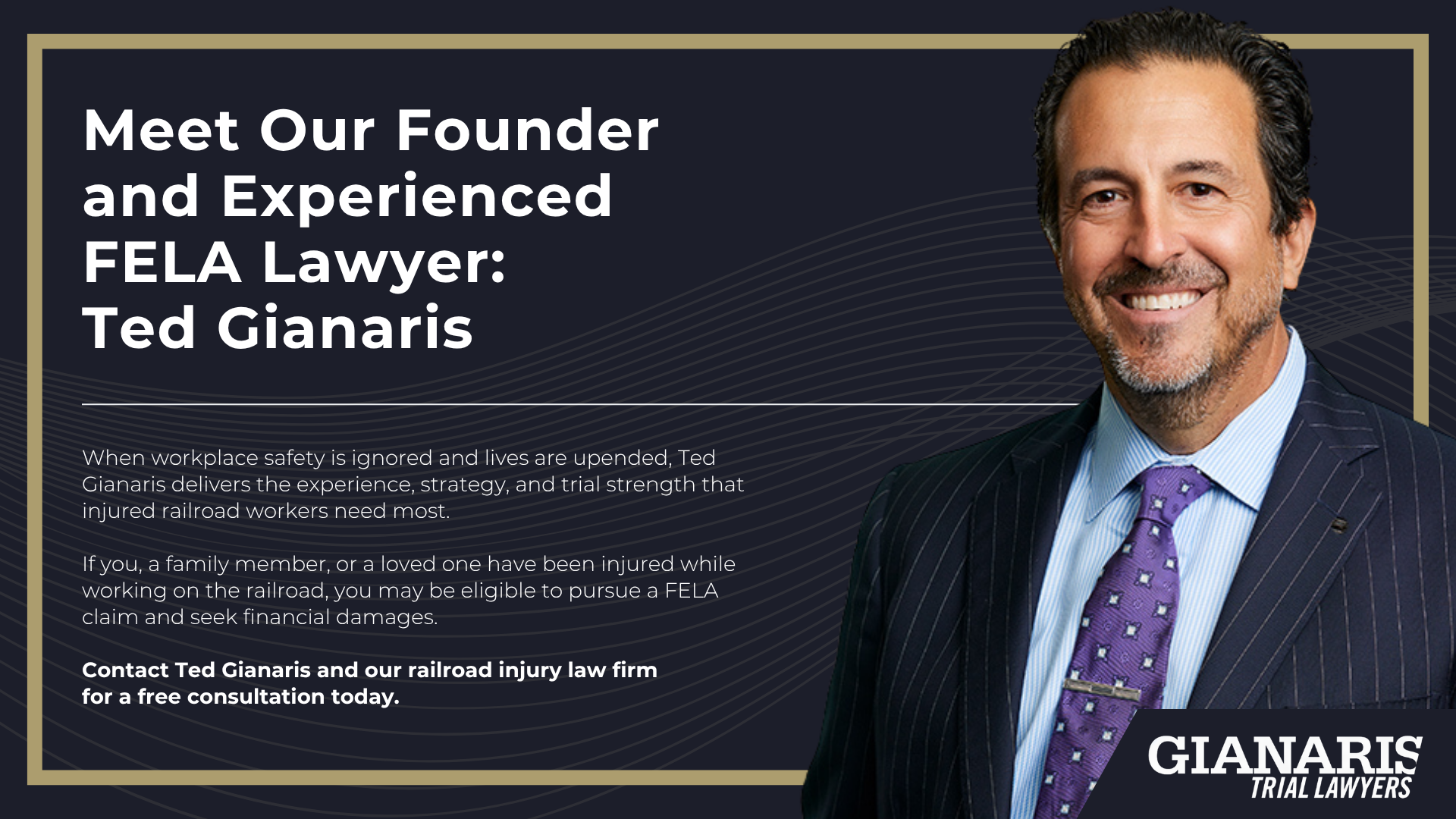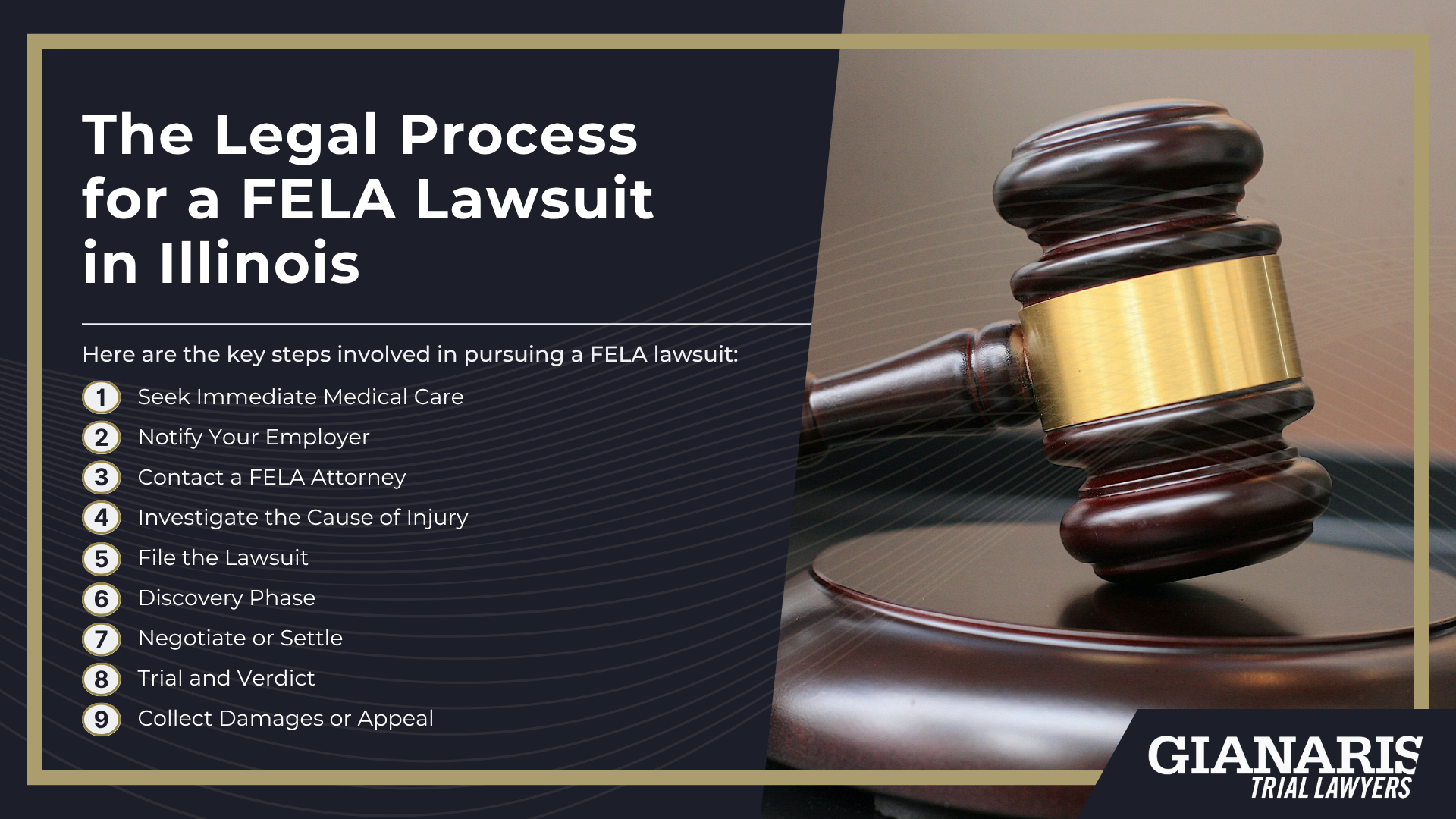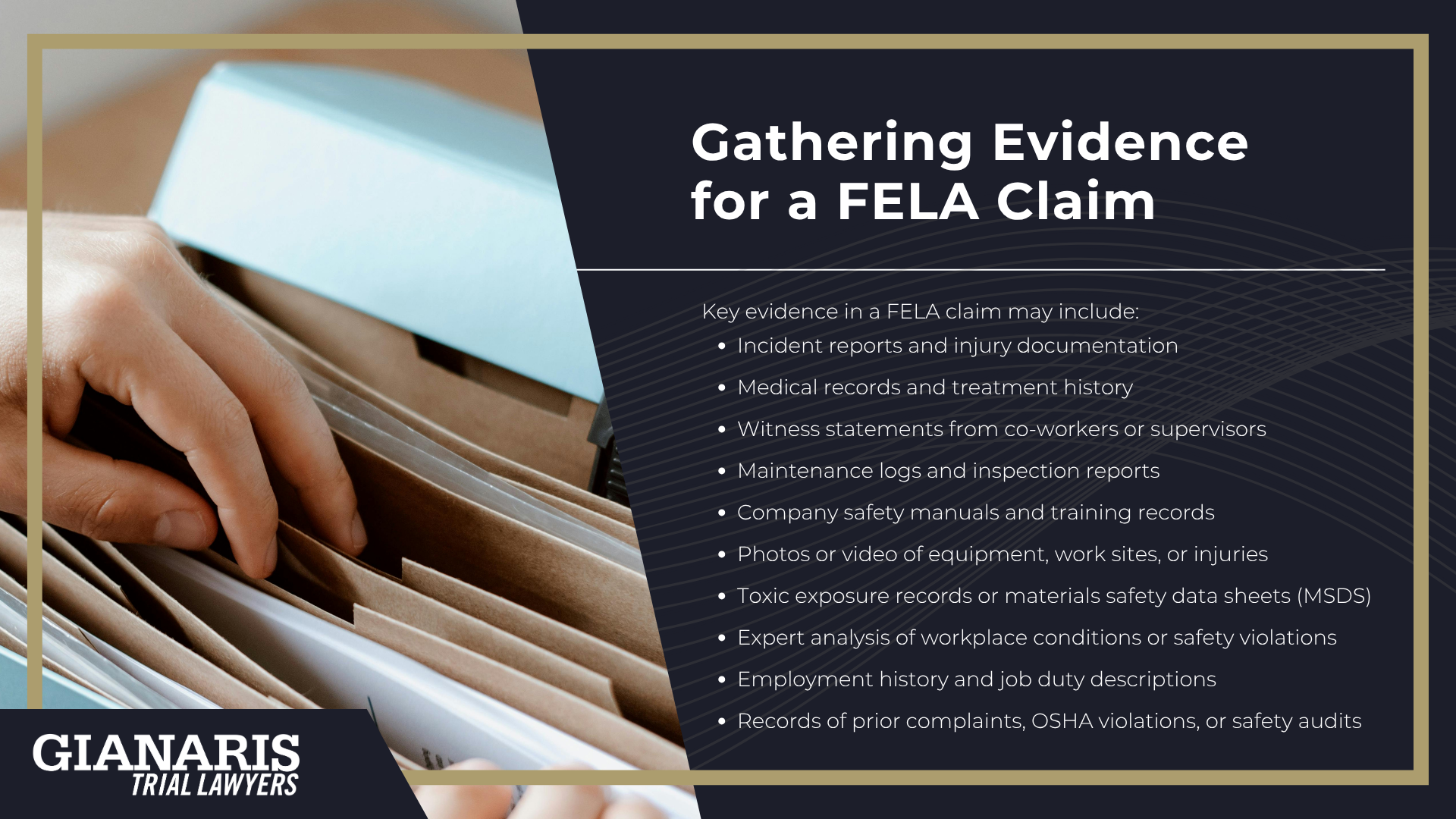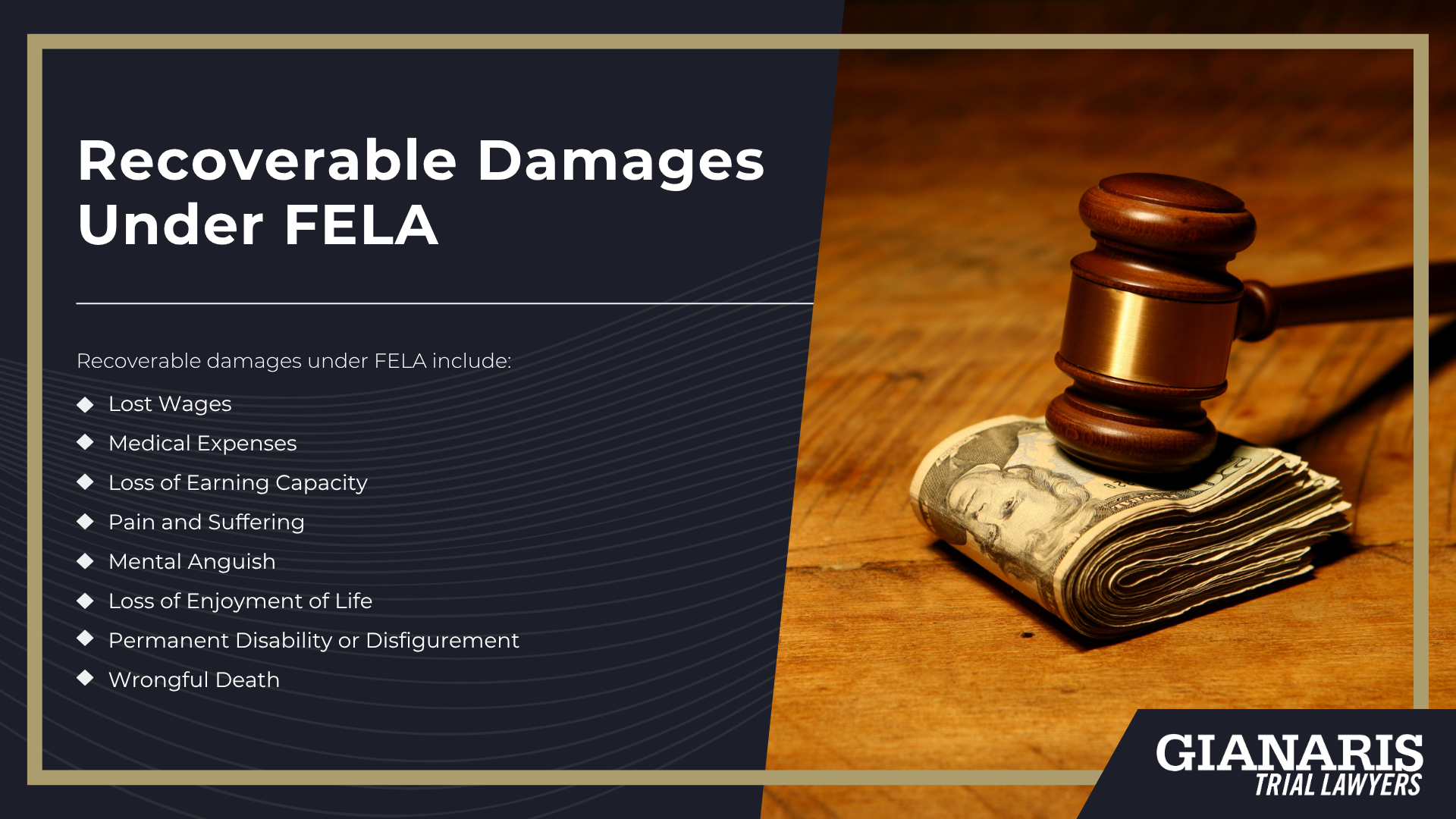The Federal Employers Liability Act (FELA), passed by Congress in 1908, was created to offer legal protection to railroad workers who suffer injuries or illnesses as a result of their employer’s negligence.
Unlike traditional workers’ compensation systems, which operate on a no-fault basis, FELA requires the injured worker to prove that the railroad company was at least partially responsible for creating unsafe working conditions.
In exchange for that higher burden of proof, FELA allows for more substantial financial recovery—including compensation for pain and suffering, full lost wages, and diminished future earning capacity.
FELA works alongside other important federal safety laws like the Safety Appliance Act, the Locomotive Inspection Act, and the Federal Railroad Safety Act, all of which establish minimum safety standards for rail operations and equipment.
When railroads violate these laws, that violation can serve as powerful evidence in a FELA claim.

The law applies broadly to nearly every aspect of railroad employment, including injuries caused by:
- Malfunctioning or poorly maintained equipment
- Unsafe workplace practices or dangerous environments
- Inadequate training or lack of proper supervision
- Failure to conduct required safety inspections
- Violations of federal rail safety regulations
To succeed under FELA, the worker must show that the railroad’s negligence contributed to their injury or illness—even if it wasn’t the only cause.
These claims can be filed in either state or federal court, offering flexibility in legal strategy.
FELA is also applicable to long-term illnesses caused by repeated exposure to harmful substances on the job, such as diesel fumes, asbestos, or chemical solvents.
For injured railroad workers, FELA remains one of the most effective legal tools available to demand accountability and secure meaningful compensation.
Types of Injures Commonly Claimed Under FELA
Railroad work is inherently hazardous, with physically demanding tasks performed in unpredictable and often dangerous environments—whether aboard moving locomotives, within rail yards, or inside maintenance shops.
Each role presents unique risks: brakemen may be injured during coupling operations, engineers endure constant diesel exposure in the cab, and shop workers like electricians and machinists routinely handle toxic materials, heavy machinery, and confined spaces.
The nature of the job places railroad workers at continual risk for both acute traumatic injuries and long-term occupational illnesses.
When a railroad company’s negligence—such as unsafe procedures, defective tools, or poor training—contributes to these injuries, workers can pursue compensation under the Federal Employers Liability Act (FELA).
FELA covers a broad range of injuries, allowing workers to recover financial damages for lost income, medical care, and the physical and emotional toll of their condition.
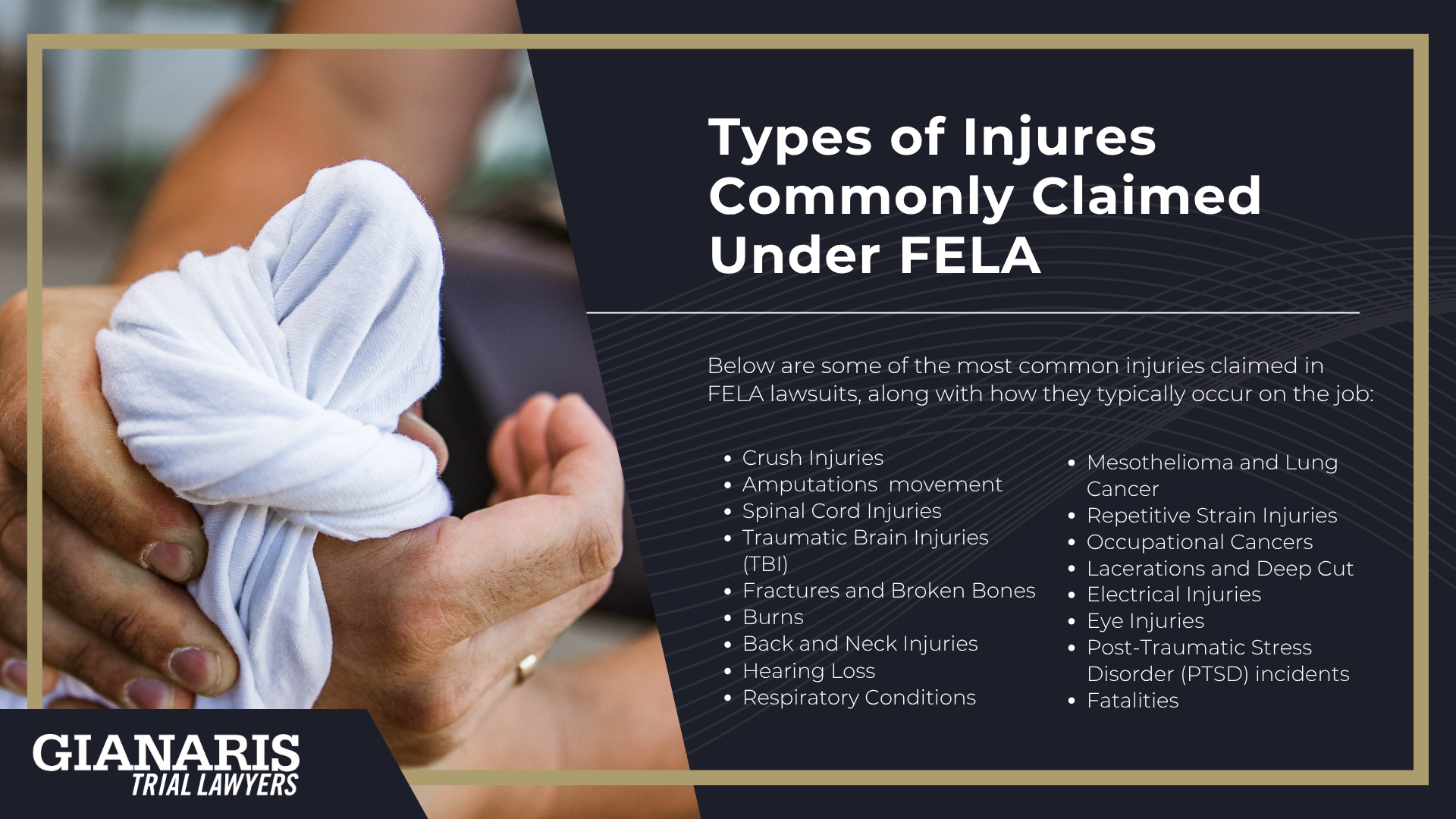
The following are examples of injuries frequently claimed in FELA lawsuits, along with the workplace hazards that cause them:
- Crush Injuries – Occur when workers are pinned between railcars or struck by moving equipment
- Amputations – Often result from entanglement in unguarded machinery or unexpected railcar movement
- Spinal Cord Injuries – Caused by high-impact falls, derailments, or equipment collisions
- Traumatic Brain Injuries (TBI) – Result from being hit by tools, slipping on oily surfaces, or falling debris
- Fractures and Broken Bones – Common in falls from equipment, platforms, or uneven ground
- Burns – Caused by electrical faults, hot surfaces, or flammable materials during refueling or maintenance
- Back and Neck Injuries – Stem from lifting heavy tools, repetitive motion, or vibration exposure
- Hearing Loss – Linked to chronic exposure to loud machinery, horns, and engines in enclosed spaces
- Respiratory Conditions – Develop from inhaling diesel exhaust, asbestos, silica dust, or chemical fumes
- Mesothelioma and Lung Cancer – Frequently tied to long-term asbestos or diesel exhaust exposure
- Repetitive Strain Injuries – Affect muscles, joints, and tendons from continuous physical tasks
- Occupational Cancers – Such as kidney, bladder, or blood cancers, linked to benzene and solvent exposure
- Lacerations and Deep Cuts – Result from sharp tools, metal edges, or broken equipment
- Electrical Injuries – Suffered during contact with live circuits, poorly insulated wires, or faulty grounding
- Eye Injuries – Caused by sparks from welding, flying debris, or chemical splashes during maintenance
- Post-Traumatic Stress Disorder (PTSD) – Arising from serious accidents, collisions, or fatal incidents
- Fatalities – In cases involving deadly workplace accidents or terminal occupational illnesses
These injuries can permanently alter a worker’s ability to perform their job or live independently.
FELA gives injured railroad employees a legal path to seek justice and recover meaningful compensation when employer negligence plays a role in their suffering.
How Long Do You Have to File a FELA Claim?
The Federal Employers Liability Act (FELA) sets a strict time limit for injured railroad workers to pursue legal action against their employer.
In most cases, the statute of limitations is three years from the date the injury occurred.
However, for occupational illnesses—such as cancer caused by prolonged exposure to diesel fumes, asbestos, or benzene—the deadline may start from the point when the worker first knew, or reasonably should have known, that their condition was related to their railroad employment.
This is especially relevant in cases involving delayed diagnoses, where symptoms may not appear until decades after the exposure occurred.
Failing to file within this legal window can result in the dismissal of the claim, no matter how severe the injury or how clear the employer’s negligence.
Because these cases often require extensive investigation, documentation of exposure history, and medical analysis, time is a critical factor.

The sooner a claim is initiated, the better the chance of locating key witnesses, securing employment records, and preserving physical evidence.
Delaying legal action can seriously undermine your ability to recover full and fair compensation.
For railroad workers or their families, consulting with a FELA attorney early in the process is essential to protecting their rights and building a strong case.
